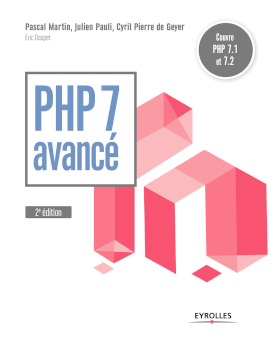PHP 7.1: a few other things
September 14, 2016 —Cet article est aussi disponible en français.
This is the 8th post in a series about PHP 7.1.
After a year of work, evolutions brought by PHP 7.1 are not limited to those I presented these past few days!
Here’s the rest of the list, grouping in this post pretty-much all remaining new features, even if they didn’t really catch my eye for now – but might still be of interest to some of you?
Asynchronous Signal Handling
Until PHP 7.1, dealing with signals with the pcntl extension required us to call pcntl_signal_dispatch() by hand, synchronously, or to use declare(ticks=1) – with a non-negligible impact on execution.
We use PHP more and more in command line or for long scripts, in which cases we must often deal with signals efficiently, as they are a rather typical inter-process communication mean. To answer this need, we can now, with PHP 7.1, handle signals asynchronously, thanks to the new pcntl_async_signals() function.
pcntl_async_signals(true);
pcntl_signal(SIGTERM, function ($signo) {
var_dump("SIGTERM"); die;
});
while (true) {
usleep(100);
}
Sending a TERM signal to our process (via kill 31321 and adapting the PID ;-)) will cause the execution of the callback function, which in this example displays the name of the signal and ends the script.
The pcntl.async_signals configuration directive, which defaults to 0, allows us to systematically enable this behavior, without having to call pcntl_async_signals(true). This default value will probably change in a future version of PHP.
‣ The: Asynchronous Signal Handling
Octal overflow detection
With PHP, we can include a byte in a string, using its octal representation:
$str = "Un caractère : \123";
var_dump($str);
// string(17) "Un caractère : S"
But, for this representation to really fit in one byte, its firts digit must be between 0 and 3. A higher digit will cause an overflow: "\400" will actually correspond to "\000", "\500" will be interpredted as "\100" and so on. This means the following piece of code results in the same output as the previous one:
$str = "Une tentative : \523";
var_dump($str);
// string(17) "Une tentative : S"
This overflow was silent with PHP 7.0. Now, with PHP 7.1, the behavior remains the same but a warning will be raised, indicating the developer she wrote something odd:
Warning: Octal escape sequence overflow \523 is greater than \377 in .../demo-01.php on line 12
‣ The RFC: Octal overflow detection
And some other stuff, if you are curious
Finally, and presented as-is, here are the other RFCs which passed and will bring new features for PHP 7.1 – I won’t be giving any example nor present them more in detail:
ext/curlHTTP/2 Server Push Support- OpenSSL AEAD support
IntlTimeZone::getWindowsID()- More precise float value
- Add
curl_multi_errno(),curl_share_errno()andcurl_share_strerror() - Additional Context in pcntl_signal Handler
- RNG fixes
These evolutions shouldn’t have much impact on your application, but could still be helpful in some situations – like allowing for a more precise representation of floatting-point values or beginning introducing support for HTTP/2.
The end of this series is getting near, but I still have a few points I want to write about.
Tomorrow, we’ll see a list of ideas which have been mentionned during the development cycle of PHP 7.1 but ended up not being adopted.

